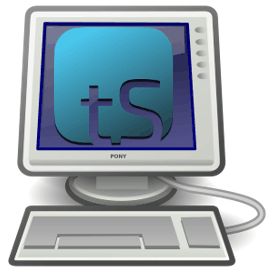tS for Desktop: Uploading or Exporting Your Work¶

When you work in translationStudio, your text is saved every five minutes to your computer. Your work is not saved to Door43 until you upload it.
While you are in a project in translationStudio, click the 3-dot icon to access the options menu. Select Upload/Export (the upward arrow icon ).
Note: The upload/export option is not available in the 3-dot menu on the home screen, but is available only from the project screen.
There are four options to choose from when exporting from translationStudio.
Upload to Door43¶
This requires an Internet connection.
This option copies your work to the online Door43 server, making it available to be downloaded by other translators, merged with other projects, or used as an online backup. You can upload to Door43 only if you have an internet connection and are logged in to a Door43 account.
Follow this process to upload to Door43:
- When you are in a project, click the 3-dot menu.
- Click the bar Upload to Door43.
- Wait while the upload process takes place.
- If you are connected to the Internet and signed into a Door43 Account, you will receive an “Upload Complete” message.
- The message displays a link to the online repository of the file.
- Click the link to open the repository, OR click Close to close the window.
- If you are NOT connected to the Internet, you will receive be an “Upload Failed” message.
- Click Close to close the window.
- When you can be connected to the Internet, start the upload process again.
Export to USFM File¶
This creates a file of your project with a usfm extension. United Standard Format Marker (USFM) is the international standard of Biblical text.
Follow this process to export, or save, the project to a usfm file:
- Click the bar Export to USFM File.
- The computer’s File Explorer window opens to the translationStudio folder. Using the file manager, navigate to the desired location on the computer to save the file.
- Rename the file if desired.
- Click Save. A window shows a ‘Project Exported’ message.
- Click Close to close the window.
Export to PDF File¶
This creates a pdf file of your project. Portable Document Format (PDF) is an international standard for sharing documents.
Follow this process to export, or save, the project to a pdf file:
- Click the bar Export to PDF File.
- Choose the options from the menu. You may choose any number of the options.
- Include incomplete chunks - these are chunks in the translation that have not been marked ‘done.’
- Double space text - this adds an extra empty line between each line of text.
- Fully justify text - this creates a document where the text is all the way to the beginning and the end of each line of text.
- New page for each chapter - this creates a document where the start of each chapter is on a new page.
- Click Create Preview. Wait for the document to be created.
- Scroll through the preview to see what the document looks like.
- If changes are needed …
- To the content - return to the Project.
- Click on Project at the left edge of the top green bar.
- Make changes to the content.
- To the formatting of the document - return to the Project.
- Click on Project at the left edge of the top green bar.
- Click the 3-dot icon to invoke the Options menu.
- Choose Upload/Export on the menu.
- Repeat steps 1 -5 above.
- To save the document:
- Click Save to PDF on the top bar.
- The computer’s File Explorer window opens.
- Using the file manager, navigate to the desired location on the computer to save the file.
- Click Save.
- A window displays a ‘PDF Created’ message.
- Click Close to close the window.
Export Project File¶
This creates a file of your project with a tstudio extension. This can be used in any other translationStudio version 11 program for either Desktop or Android.
Follow this process to export, or save, the project to a tstudio file:
- Click the bar Export Project File.
- The computer’s File Explorer window opens to the backup folder for translationStudio. Using the file manager, navigate to the desired location on the computer to save the file.
- Click Save. A window displays a ‘Project File Complete’ message.
- Click Close to close the window.